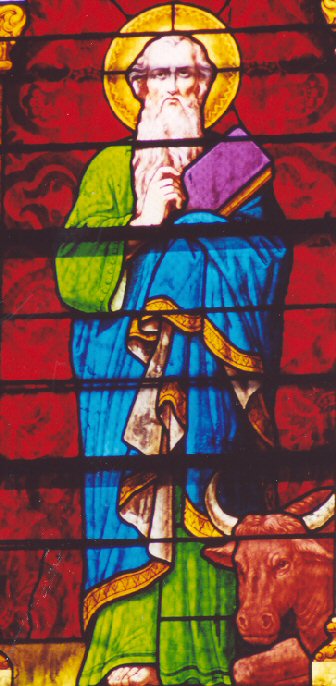
Luke 9:51-62
What Does it Take to be a Disciple of Jesus?
by Rev.
Paul deLaduarantaye
Reprinted with permission of "The Arlington Catholic
Herald"
Home Page
To Sunday Gospel Reflections Index
Written to explain that
Christ came to save everyone.

When the days for Jesus' being taken up were fulfilled, he resolutely determined to journey to Jerusalem, and he sent messengers ahead of him. On the way they entered a Samaritan village to prepare for his reception there, but they would not welcome him because the destination of his journey was Jerusalem. When the disciples James and John saw this they asked, "Lord, do you want us to call down fire from heaven to consume them?" Jesus turned and rebuked them, and they journeyed to another village. As they were proceeding on their journey someone said to him, "I will follow you wherever you go." Jesus answered him, "Foxes have dens and birds of the sky have nests, but the Son of Man has nowhere to rest his head."
And to another, he said, "Follow me." But he replied, "Lord, let me go first and bury my father." But he answered him, "Let the dead bury their dead. But you, go and proclaim the kingdom of God." And another said, "I will follow you, Lord, but first let me say farewell to my family at him." To him Jesus said, "No one who sets a hand to the plow and looks to what was left behind is fit for the kingdom of God."
The Gospel that we consider this week takes place after the Lord’s Transfiguration. During the Transfiguration account, Jesus’ face and clothing changed, radiating forth the glory of God. Now the days for Jesus to be taken up into heaven are fulfilled and St. Luke tells us that “he resolutely determined to journey to Jerusalem.” The words “resolutely determined,” in the original Greek of the Gospel, literally mean “set his face” toward Jerusalem. In other words, the glory of God that shone from the face of Jesus on Mount Tabor is now to shine in Jerusalem through His suffering, death and resurrection. Thus, Jesus begins His one and final journey (as St. Luke portrays it) to Jerusalem, a journey through death to eternal life.
On the way, the Lord imparts valuable lessons about discipleship. The first comes when the Samaritans, whose village Jesus and His followers enter, refuse to accept Him. James and John want to destroy the village, but Jesus rebukes them: They are not yet disposed to grasp the meaning of discipleship. Jesus has not come to make people His slaves with fire or the sword. Rather, He has come to give up His life for us – not to compel us to do anything, but to free us from the compulsion of sin. Neither defiance nor vindictiveness prepares us to be the Lord’s disciples. Instead, Jesus specifies three other qualities of worthy discipleship in His interactions with those who meet Him on His journey.
One person enthusiastically declares that he will follow the Lord wherever He goes. Jesus responds by pointing out the cost of disciples in both material and spiritual terms: “The Son of Man has nowhere to lay his head.” With these words, the Lord reminds His would-be-follower that discipleship has to grounded in concrete commitment, not just enthusiasm. What are we willing to give up or set aside for the sake of the kingdom of God? What do I have to learn to let go of in order to follow Christ with single-mindedness, with a purity of mind, heart and intention? Moreover, the Son cannot rest (“lay His head”) anywhere on earth until He has fulfilled His Father’s will. In a similar way, we must resist all temptations to take refuge in our own security or safety. Like Christ Himself, we too are called to be resolutely determined to unite ourselves with Him and enter into communion with the Father and the Holy Spirit as the guiding and decisive commitment of our lives.
Jesus then calls a second person who asks that he first bury his father. The Lord replies with strange-sounding words: ”Let the dead bury their dead.” Jesus does not mean to disparage family ties or the need to provide funeral rites for the dead; instead, His words are intended to help us overcome the temptation to find excuses for procrastinating or even for disqualifying ourselves from discipleship. Any one of us can say, “I will follow Christ later – when I retire, when the children leave for college, when I have more time.” Jesus stresses the urgency of discipleship here and now by calling for full surrender in confidence to the providence of God the Father who in turn will provide for every human need.
Finally, those who would be disciples are to put their hand to the plow and not look back. Christ wants the whole of each person – He wants us to go with Him on life’s journey with an undivided heart and a willing spirit. Gospel discipleship can never be a halfway proposition: Despite our weaknesses and failures, we either seek to be with Christ or we do not – there really is no middle ground.
Elsewhere in the Gospels, Jesus declared that a disciple should be glad to be like his Master. Just as Jesus “set his face” – “resolutely determined” – to go up Jerusalem in order to pass through death to lie, so each of us is called to do the same. To set our face toward Jerusalem with Jesus means making the Father the source and the goal of our love. It means making a total commitment, here and now, to follow the Lord on a daily basis. When the Father sees such resolve on our faces, then He takes us up into His love with His Son – and this is our fulfillment.
Top
Home Page
To Sunday Gospel Reflections Index